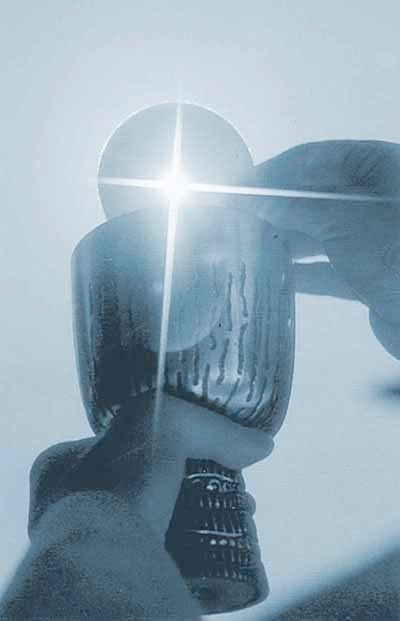 It has been forever evident to man that the most spontaneous and simple sign of unity and friendship is to eat together, to share bread. This custom was also practiced in the time of Jesus.
It has been forever evident to man that the most spontaneous and simple sign of unity and friendship is to eat together, to share bread. This custom was also practiced in the time of Jesus.And among the many family meals which a Jewish family could celebrate, there was a most special one: the Easter Passover meal. It was in thanksgiving to God for the miracle of being freed from Egypt. In this meal, the Jewish family expressed its unity not only within itself, but also with its God. It was while celebrating this meal that Jesus consecrated the bread and wine, instituting the Eucharist.
The Eucharist is the pinnacle of the life of the Church and the crown of her sacraments. It is the great Supper of thanksgiving for the Christian family in which we celebrate the gifts received from the love of the Father We are grateful, in the first place, for Christ, for the miracle of his Death and Resurrection which freed us from sin and death. We are grateful that Christ made us sons and brothers.
In the Eucharist, we also express our family unity, eating the Bread and Wine which are the Body and Blood of the Lord. With this gesture, the Church manifests that which is most profound of itself: the intimate communion of the love of men , among themselves and with God, achieved in Christ.
Thus the Eucharist constitutes a true anticipation on this earth of what will be the life of the Family of God… once consummated in the Kingdom of Heaven. Therefore, the Eucharist is the crown of all the sacraments.
She is the Church’s sacrament of unity: because she expresses it and increases it. Those who are not living this unity cannot approach the table of the Lord because their gesture of sharing one and the same bread with Him and others would be a lie.
Therefore, St. Paul asks that each one should examine himself before eating the Bread and drinking the Wine. And the Lord tells us that if someone remembers having offended his brother to go first and reconcile with him and then return to the altar because communion cannot be a drama of brotherhood which we celebrate on Sunday, while during the week we stab each other with our hate, our rancor, and our injustices.
There should be continuity between daily life and Eucharist. When we take communion, we should express that unity which we are already experiencing in some way in our home, in our neighborhood. Or, at least we should manifest the sincere effort in which we are striving to build a world where there is more love and unity.
God knows we are sinners, that we are on the way like ancient Israel. From this point of view, the Eucharist is the banquet with which the Father embraces and celebrates his prodigal sons. Banquet of pardon and reconciliation for those who humbly confess their betrayals and return to ask for the Bread which can help them to be better sons and better brothers.
Nobody like Mary to best teach us how to approach the Eucharist. This was her great sacrament, the only one she received in the same way we did. Each time she received that Bread which was the Body of her Son from the hands of St. John, Mary must have been deeply moved because she acknowledged the same Bread which she, during nine months, had prepared with love in her womb…..because she knew it was flour from her own wheat.
The Virgin had made her “First Communion” on the day of the Annunciation. A unique “First Communion” which was prolonged during the nine months that Jesus lived in her body. Later, each time Mary took communion, she relived those months of profound spiritual and physical union with the Son she expected.
Therefore, let us ask the Blessed Virgin that she teaches us the way to approach the Eucharist. May she help us to awaken in us her attitude of the Annunciation. That is, with a poor and pure heart, available, capable of believing and saying “yes” because everything else belongs to the Lord for whom nothing is impossible.
Questions for reflection
1. Do I feel united to my community?
2. Do I take communion when I have fallen out with others?
3. Do I relate Mary with the Eucharist?